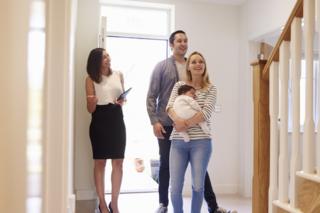Stamp duty holiday: How would it work?
 Image copyright
Getty Images
Image copyright
Getty Images
The chancellor is expected to announce changes to stamp duty on Wednesday to help cut costs for anyone buying a home.
It's understood that the level at which the tax is charged could be temporarily raised to £500,000 to boost the property market and help buyers struggling because of the coronavirus crisis.
What is stamp duty?
Stamp duty is a tax paid by people buying properties, although it varies slightly across the UK.
In England and Northern Ireland buyers pay Stamp Duty Land Tax.
In Scotland it is Land and Buildings Transaction Tax, while in Wales buyers pay Land Transaction Tax.
The amount handed to the government depends on where you are in the UK, the price of the property and whether you're a first-time buyer.
The expected changes to stamp duty will only apply to buyers in England and Northern Ireland.
Who pays stamp duty and how much?
In England and Northern Ireland stamp duty is paid on land or property sold for £125,000 or more.
However, first-time buyers pay no tax up to £300,000 and 5% on any portion between £300,000 and £500,000.
For people who have bought a home before, stamp duty rates are 2% on £125,001-£250,000, 5% on £250,001-£925,000, 10% on £925,001-£1.5m, and 12% on any value above £1.5m.
That means someone spending £248,000 - the average cost of a house - would currently pay £2,460 in stamp duty to move home.
Landlords pay an extra 3% of stamp duty when they purchase a buy-to-let property in England and Northern Ireland.
What about Scotland and Wales?
In Scotland, the rates on Land and Buildings Transaction Tax are 2% on £145,001-£250,000, 5% on £250,001-£325,000, 10% on £325,001-£750,000, and 12% on any value above £750,000.
Scottish landlords pay an extra 4% Land and Buildings Transaction Tax on top of standard rates.
In Wales, the rates on Land Transaction Tax are 3.5% on £180,001-£250,000, 5% on £250,001-£400,000, 7.5% on £400,001-£750,000, 10% on £750,001-£1.5m, and 12% on any value above £1.5m.
Welsh landlords pay an extra 3% Land Transaction Tax on top of standard rates.
What could change?
There is speculation that the government could increase the lower stamp duty threshold to £500,000.
That means any property purchases below the new level would not need to pay stamp duty.
The move would help buyers who have taken a financial hit because of the coronavirus crisis.
It is also aimed to boost a property market hit by lockdown. According to the Halifax, house prices have fallen for four months in a row.
When will the stamp duty holiday happen?
It is likely to be announced on Wednesday in the chancellor's summer statement.
The increase will probably be temporary, though, perhaps lasting six months, which the government feels is long enough to help revive the flagging property market.
However, rumours that it may not begin until October, at the time of the autumn Budget, prompted critics to warn it could encourage people to delay their plans for buying a home, extending the current property market blues for another three months.
It could also encourage people planning to buy next year to accelerate their plans to take advantage of the tax break, leading to a potential property demand slump when the stamp duty holiday is over.
How much could a buyer save?
The more you pay - up to the possible new £500,000 threshold - the more you could save on stamp duty.
If you currently buy a house for £275,000, for instance, the stamp duty you'd have to pay would be £3,750.
That's based on 0% duty on the first £125,000, 2% on the next £125,000 (£2,500), plus 5% on the final £25,000 (£1,250).
Meanwhile anyone buying a home in Bramhall, Stockport would save £13,603 in stamp duty, based on Rightmove estimates of an average asking price of £472,053.
How much does stamp duty raise?
The government's annual take from stamp duty is around £12bn, according to the latest figures released by HM Revenue and Customs (HMRC).
That's roughly equivalent to 2% of the Treasury's total tax take.
Are you about to move house or planning to move? How will you be affected by the changes in stamp duty? Share your experiences by emailing haveyoursay@bbc.co.uk.
Please include a contact number if you are willing to speak to a BBC journalist.